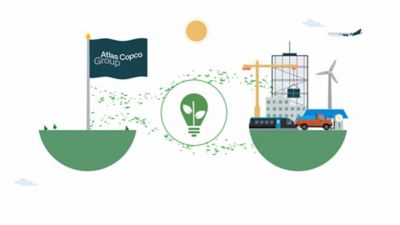Lean principles in action
May 29, 2015
Operational excellence is a culture that drives an organization to look continuously for a better way. Lean means to Atlas Copco combining the promise of the Atlas Copco brand, Committed to sustainable productivity, with the conviction that there is always a better way.
Hans Thibau even applies the lean concept at home, in order to never run out of mayonnaise.
Lean is a path to a smooth work flow, and it can be applied to every aspect of a task. Atlas Copco’s Hans Thibau follows lean principles both at work and at home.
Hans Thibau, who serves as General Manager for Industrial Technique in Sweden and Hungary, is a genuine lean believer. “Lean isn’t just an approach to efficient manufacturing – it’s a way of life,” he says. “I always try to have an empty mailbox. I don’t like being a bottleneck for other people. If we can help each other immediately by reacting quickly, it creates enormous momentum within the organization.”
Lean’s philosophy of reducing waste and preserving a smooth flow comes from Japan, where Toyota used the approach to revolutionize car manufacturing. Now, Atlas Copco is embracing lean company-wide, with a new booklet that Thibau helped produce, “Pocket guide to lean: How to work in a culture of continuous improvement.”
“The principles are originally Japanese, of course, but we adapted them to our needs,” Thibau says. “Through product and process design, we can guarantee a high degree of flexibility for the customer.”
Lean culture strives to add customer value with maximum efficiency, and to keep improving every day. Thus the mantra of Atlas Copco: There is always a better way.
“Lean creates a lot of Zen, or peace of mind.” Thibau says. “Lean builds a safe environment. Lean is by nature very stable, predicable and transparent. Deviations get the highest attention, so they do not create stress over a longer period.”
Employees work as a team, and each person takes responsibility for doing the job better. Lean principles can be applied to virtually every aspect of manufacturing, from building the plant to customer communications. Examples from Atlas Copco include:
Improving heavy rig assembly at Drilling Solutions in the United States. Before lean, the heavy drill rigs were assembled from start to finish while standing in one place. Lean principles led to a flow line setup, which allows more flexibility and reduces training time for workers.
Raising the efficiency of field service engineers worldwide. Under the old system, service calls involved lengthy office reports, requiring up to 48 different screens and clicks. Applying lean ideas, field service engineers have begun using mobile devices, which greatly reduce time spent on administration and paperwork.
Streamlining product development at the Rocktec division in Sweden. Before lean, too many new products were being designed at once, and engineers were stretched too thin. Lean principles helped the division to focus and leverage the introduction speed of new products. To encourage employees around the world to make more improvements like these, Atlas Copco has also developed a “PechaKucha” on the lean approach, a recommended – and highly efficient – form of PowerPoint presentation.
Thibau even takes certain lean concepts into his home. His favorite is Kanban. In the workplace, Kanban refers to a visual pull-system that gives the go-ahead for the next step in supply or production. The system limits the amount of stock or work in progress at any given time.
At Thibau’s home in Stockholm, Sweden, he applies the approach to everyday items like mayonnaise. By always having one in use and one as a spare, he neither runs out of mayonnaise nor stockpiles so much that it expires.




